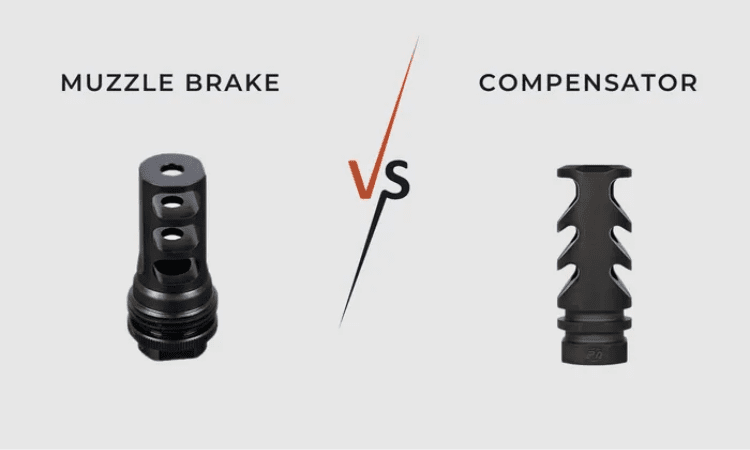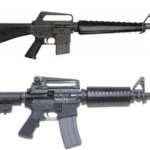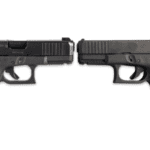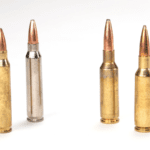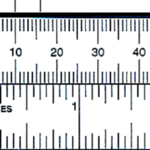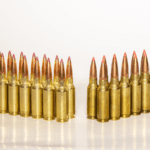If you want to increase your accuracy, you need to decide between a muzzle brake and a compensator. Different muzzle devices serve different purposes, but they all have the goal of making firearms easier to handle by decreasing recoil. To help you choose the right accessory for your shooting needs, we’ll break out the differences between a muzzle brake and a compensator.
Understanding Compensators and Muzzle Brakes
Before diving into the intricacies, let’s build the basis by learning what muzzle brakes and compensators are for. Muzzle brakes are designed to redirect the expanding gases at the end of a barrel, reducing recoil. A compensator, on the other hand, is designed to reduce muzzle rise by redirecting gasses upward. Let’s have a look at the mechanics behind these instruments.
Muzzle Brakes and Their Effect on Recoil
Taming the Recoil Beast
Muzzle brakes are quite effective in dampening the sometimes-vigorous recoil produced by firearms. To reduce the feeling of recoil, gases are released in a backward and slightly upward direction. This makes them a favorite among shooters who want more command and faster target acquisition, especially during rapid-fire sequences.
Precision Shooting and Muzzle Brakes
Accurate shooters can also benefit from muzzle brakes. They’re useful for long-range shooting since their lessened recoil allows for more accurate aiming. Maintaining sight during and after a shot allows shooters to swiftly detect hits and adjust accordingly.
Managing Muzzle Rise: Compensators in Action
Countering Muzzle Climb
The primary function of a compensator is to reduce muzzle rise, or the upward movement of the weapon after firing. By redirecting gases upward, compensators reduce the muzzle rise that occurs during rapid fire. Therefore, compensators are often used in competitive shooting, where millisecond precision is of paramount importance.
Competitive Shooting and Compensators
Minute differences can determine victory or defeat in the realm of professional shooting. The use of compensators allows the shooter to keep a level stance and quickly switch targets. This advantage could prove decisive in competitions like IPSC (International Practical Shooting Confederation) where timing and precision are of the essence.
Balancing Noise and Muzzle Blast
Decibel Differences: Muzzle Brake vs Compensator
When weighing the pros and cons of compensators and muzzle brakes, the level of noise they generate is a common consideration. For the shooter and anybody in the vicinity, muzzle brakes can increase the volume of the muzzle explosion by redirecting gases rearward. Since compensators send gas upward, they often result in less concussion than standard airbags.
Practical Considerations for Noise Control
When choosing between the two, the shooting atmosphere is crucial. Muzzle brakes may be preferable for use on open outdoor ranges where the spread of noise is not a concern. However, in confined places or other situations when noise reduction is paramount, compensators may be preferred.
Application Scenarios
Hunting and Muzzle Brakes/Compensators
When hunting, you can benefit from both a muzzle brake and a compensator. Hunters often need to minimize recoil to increase their chances of making accurate follow-up shots. A muzzle brake is helpful in this situation. Hunting in noisy urban areas or other noise-sensitive environments requires special attention to the noise factor.
Defensive Shooting and Firearm Control
If a compensator can reduce muzzle rise, it could be useful for defensive shooting, when accurate follow-up shots are crucial. The reduced upward movement of the rifle allows for more precise target engagement under stress. The effects of noise and muzzle blast must also be considered in self-defense situations.
Which Should You Pick Between a Compensator and a Muzzle Brake?
Your intended target practice will ultimately determine whether you need a muzzle brake or a compensator. If you want less recoil and more control, especially while shooting at close range, a muzzle brake may be what you’re looking for. If, on the other hand, limiting muzzle ascent and firing rapid follow-up shots are your main priorities, a compensator could be the better choice.
Conclusion
A muzzle brake or compensator is a tool that can help you shoot more accurately. Recoil reduction and muzzle rise management are two distinct features that might help you make a decision that is in line with your shooting goals. Equipment like muzzle brakes and compensators can help reduce recoil and enhance your shooting accuracy.

